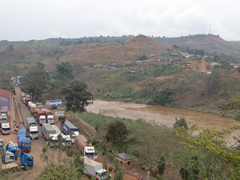The Tokyo International Conference for African Development IV (TICAD IV) set out deep regional integration as one of its key areas of focus for broadening partnership with Africa. This area of focus of TICAD IV is in tandem with African Union whose inter alia focus areas is formulating African Economic Community (AEC) which recognizes eight Regional Economic Communities (RECs) as the building blocks of the Community. In addition, the resultant Yokohama Action Plan espouses support for capacity building of Regional Economic Communities (RECs) and regional development banks to better plan, finance and execute infrastructure programs, and provide technical assistance for regional infrastructure investment planning.

Problem of congestion at the Rusumo bridge, at the border of Rwanda and Tanzania
Status of regional Integration
Regional integration efforts in many of Africa's RECs are taking place in a rather varying speed. Notably, in 2011 the EAC achieved Common market status in while other RECs are at nascent stages carrying out harmonization among the member states. In recognition of the challenges posited by the overlapping membership and other pertinent challenges within the RECs, the African Union developed a Minimum Integration Programme (MIP) which embodies the activities of the projects and programmes which the RECs need to implement to speed up and ensure the successful conclusion of the regional and continental integration process. The programme takes into cognizance variable geometry integration approach according to which the RECs are expected to progress at different paces towards integration implement their respective priority programmes and at the same time endeavor to work to actualize other activities contained in the MIP.
A remarkable development in regional integration is the formation of COMESA-EAC-SADC Tripartite in 2008 comprising of twenty six countries. The Tripartite has adopted a developmental approach to the Tripartite Integration process that will be anchored on three pillars namely: Market integration based on the Tripartite Free Trade Area (FTA); Infrastructure Development to enhance connectivity and reduce costs of doing business as well as Industrial development to address the productive capacity constraints. Negotiations for the FTA were launched in 2011.
Harmonization of Vehicle Overload Controls and Regulations
The operations of RECs and to a great extent achievement of the objectives of the envisaged Africa Economic Community have been hampered by infrastructural, institutional, and legal/policy challenges. Individual Partner states in the RECs have continued to use policies and regulations that are not congruent with other cooperating members in the same REC which are at time counterproductive to the integration agenda. This scenario necessitates harmonization of such policies.
To support Regional integration efforts, JICA in collaboration with EAC Secretariat has been working together in harmonization of policies and regulation in the region. A good example in 2011 has been study for harmonization of vehicle overload controls and regulations for the East African Community. Prior to this initiative, countries in the EAC region had been using different overload control standards for Gross Vehicle Mass, axle loads, vehicle dimensions and configurations which have had far reaching cost implications on cargo transportation especially for the landlocked countries of Burundi, Rwanda and Uganda. The results of the study culminated in an agreement by EAC partner states to adopt same standards which are in line with the SADC regulations. Once the regulations are embodied in an EAC Act, the partner states will then domesticate into their respective national laws.
Supporting RECs through JICA Experts
In addition, JICA has dispatched experts in various RECs and regional bodies including EAC, SADC, UEMOA, AU and African Development Bank to support various initiatives in the African region. This is informed by fact that support for RECs' integration agenda has contiguous positive impacts resonating in a wider area. Further, in 2011 JICA commissioned an in house baseline study on Regional Economic communities to identify and understand the status of regional integration. Looking forward, this study will further be extended to a more detailed analysis of the RECs to identify suitable programs and projects in the coming year.





scroll